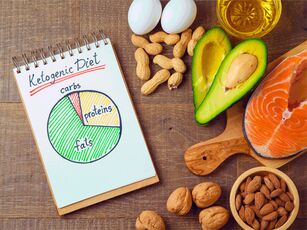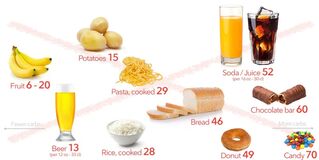
Fashion bloggers and glossy magazines everywhere shout about different weight loss methods: gluten-free diet, Kremlin, fresh juices, blood type and hundreds of others. You can argue as much as you want about the effectiveness of each method, but what's the point if the main question for women remains "how to lose weight? "“. Diets often have negative relationships because they suggest limitations and discomfort, but ketogenic nutrition is difficult to attribute to them. The keto diet is a diet high in fat and protein and minimal in carbohydrates.
How does it work?
Our body is designed to receive energy for its work from carbohydrates (glucose). An alternative source of energy is the breakdown of fats, or rather so-called ketone bodies. When the blood glucose level is low (without carbohydrates this is inevitable), fat stores are used. Swallowing them as fuel for the body and brain, the extra inches begin to leave.
Accordingly, the goal of the diet is to induce a metabolic state in which the amount of carbohydrates in the diet is reduced to a minimum and the amount of fat consumed is maximized.
Remember that any diet is stressful for the body and the body. When choosing a way to lose weight, try to properly assess your health and shape.
In 2016, the results of a study were published in which scientists and medical professionals examined the effects of a low-carbohydrate diet on the body and risk factors for cardiovascular disease. It was concluded that subjects on a low-carbohydrate diet lost significantly more weight than those who continued to consume carbohydrates. The second side of the coin was that weight loss was associated with elevated cholesterol, which is not good for health.
Today, there are a number of techniques aimed at reducing one of the BJU's metrics. The leader of the last few years can be called the Ducan diet - a protein nutrition system consisting of four stages. Which of the ways you prefer is up to you.
What is ketosis?
This is a state of the body when ketone bodies or ketones become the main source of energy. In order for the body to start working in this mode, it is necessary to observe carbohydrate starvation for 3-4 days and then proceed to one of the appropriate types of keto diet.
Types of keto diets
Classic.This is a low carb, high fat diet. In fact, the whole article is dedicated to its classic version, in which the ideal ratio of BJU is: 75% fat, 20% protein and 5% carbohydrates.
Cyclic keto diet. In this case, this means alternating 5 days with strict adherence to the diet and 2 days of so-called "cheating flour", when the consumption of 400-500 g of carbohydrates per day is allowed, which allows you to replenish glycogen stores.
This option is most often used before or during increased and intense sports activities. This diet helps to speed up metabolism, burn fat and increase lean muscle mass. Many nutritionists insist that a proper diet should be balanced, which is why they prefer this of the listed diet options.
Targeted keto diet.Suitable for professional athletes, most often used by bodybuilders. In this case, it is allowed to consume carbohydrates an hour and a half before the start of the workout. This type of ketogenic diet allows you to replenish glycogen stores so that you do not run out and at the same time do not get out of ketosis.
Positive and negative aspects of the keto diet
Pros:
- With a ketogenic diet there is no drastic change in diet and artificial reduction of calories, which usually leads to the fact that after losing weight the weight returns and sometimes even increases.
- As a rule, the feeling of hunger disappears and endurance increases.
- The keto diet can help you lose weight fast. This is why it is often used by public people to prepare for urgent photos or significant events.
- Low carb diets are often preferred by people with insulin resistance and metabolic syndrome, as they see excellent results and resolution of chronic disease. Reducing carbohydrates to ketogenic levels of 25-50 grams per day helps keep insulin levels below normal. The keto diet is also recommended as a drug-free treatment for difficult-to-control childhood epilepsy. This is evidenced by research in 2016.
- It may be beneficial to lose excess fat and improve the overall condition of people with type 2 diabetes. This was reflected in a foreign study in 2018, which involved 2, 5 thousand people. Some subjects had a low-carbohydrate diet, while others ate a more balanced diet. The study focuses on glycemic control. Through systematic observations, analyzes and comparisons, scientists have concluded that the keto diet has a beneficial effect on the body and can be used as part of an individual treatment plan, under the supervision of a physician.
Cons:
- The most common side effects are constipation, low blood sugar or upset stomach.
- Less commonly, low-carb diets can lead to kidney stones or increased acid levels in the body (acidosis).
- Other side effects may include 'keto flu', which includes headaches, chills, sometimes fever, weakness, irritability and bad breath.
- When your body burns fat, it puts a strain on the kidneys and also raises blood ammonia levels.
- Poor diet and lack of balance. As carbohydrate intake is minimized, significant dietary restrictions occur.
- Many people notice that in the beginning there is a general weakness of the body, lethargy and drowsiness.
- Ketone bodies are quite toxic to the body, so it is important not to tempt fate yourself and seek professional advice from a nutritionist or doctor who will monitor you during weight loss.
Contraindications
Who should avoid the keto diet?
- People with liver and kidney disease, high cholesterol and metabolic disorders.
- Diabetics are advised to experiment with nutrition only under medical supervision.
- Pregnant and lactating women.
What to eat and drink on the keto diet? What foods can you eat?
Rawmeat, ie without the processes of salting, canning, smoking, etc. Pork, lamb, beef, duck, fatty parts of chicken and turkey, bacon and lard are suitable. Refrain from sausages and sausages.
Fish and seafood. Salmon, salmon, saithe, sardines, mackerel, herring and all kinds of seafood are great. Avoid breading when cooking, as it contains carbohydrates.
Eggs. Eat in any form: boiled, stuffed, fried in butter, scrambled eggs, etc.

Vegetables growing above the ground. Favorites include cauliflower, cucumber, asparagus, avocado, broccoli, spinach, green beans and zucchini. Say goodbye to root vegetables: potatoes, beets, onions, carrots, celery root and more. Use olive oil or cooking oil.
Dairy products: cottage cheese, butter, cheese, cream, sour cream. The main condition is that they are thickened.
Nuts. Good for a snack other than cashews. It is better to exclude this type due to its high carbohydrate content.
Oils and fats.If we are talking about vegetable oils, then give preference to olives. Coconut is also very popular, which can significantly diversify the taste palette of food.
What should I drink?
During the keto diet it is important to drink plenty of fluids, water helps to get rid of toxins in the body.
A 2015 study found that replacing diet drinks with water after a main meal can lead to greater weight loss and also improve insulin resistance.
Eliminate all fizzy drinks and juices, energy drinks and smoothies and beer.
What to drink besides water? Coffee and tea without sweeteners and wine are the least harmful in terms of carbohydrate content.
What foods to avoid?
First of all, you have to gather all your will in a fist and give up what attracts you the most: cakes, candies, cakes, cookies, chocolate bars, donuts and cereals. Sugar-free diets have long been popular with women around the world and eliminate simple carbohydrates and refined sweeteners, which helps reduce the risk of heart disease.

Starchy foods: bread, pasta, rice, corn, potatoes, peas, chips, cereals, muesli, etc. If you see the word "whole grain", put the item back on the shelf.
Legumes, avoid beans and lentils first.
Try not to drink milk and say goodbye to latte (contains 18 grams of carbohydrates), avoid low-fat yogurt.
For fruits and berries the best choices are raspberries, strawberries, blueberries, watermelons and melons. Bananas, grapes, mangoes, pears, apples and kiwis can ruin carbohydrate statistics.
A smart man said that "losing weight without restricting food is the same as overcoming laziness without getting up from the couch. "Expect to work hard and change your eating habits.
Example of a one week keto menu
To diversify your diet and achieve your goals, you will have to love cooking. What can be the food during the week?
Monday
- Breakfast: scrambled eggs with ham, cheese and spinach.
- Lunch: chicken broth and vegetable salad, dressed with natural mayonnaise.
- Dinner: roasted fish with vegetables (green beans and herbs) and brown rice.
Tuesday
- Breakfast: omelette of grated yellow cheese and steamed fish cakes.
- Lunch: tuna salad with avocado and a mix of lettuce leaves, seasoned with olive oil or natural mayonnaise.
- Dinner: vegetable stew with meat.
Wednesday
- Breakfast: boiled eggs and toast with cream cheese and avocado.
- Lunch: borsch with meat.
- Dinner: seafood salad and cauliflower pancakes.
Thursday:
- Breakfast: 2 eggs and asparagus fried in butter.
- Lunch: puree soup and vegetable salad.
- Dinner: Baking casserole.
Friday:
- Breakfast: sandwich with smoked salmon and avocado.
- Lunch: fish soup.
- Dinner: frittata with fresh spinach.

Saturday
- Breakfast: omelette with mushrooms and cheese.
- Lunch: boiled chicken with hummus and lettuce.
- Dinner: cabbage salad and roasted turkey with cream cheese sauce.
Sunday
- Breakfast: casserole with mushrooms.
- Lunch: chicken soup.
- Dinner: avocado cutlet with green beans fried in butter.
Conclusion: how many people, so many weight loss methods. The ketogenic diet is a short-term diet that focuses on weight loss, not health benefits. The results of clinical studies examining the effect of ketogenic diets are contradictory, so it should be practiced for no more than a few months and under the supervision of a doctor.






























